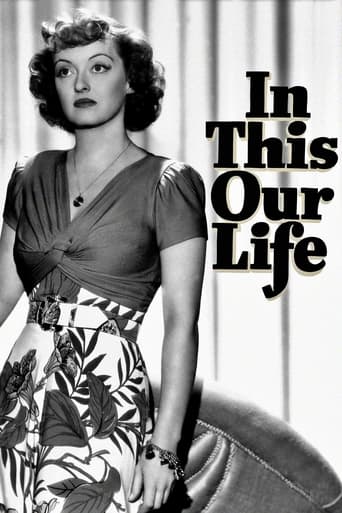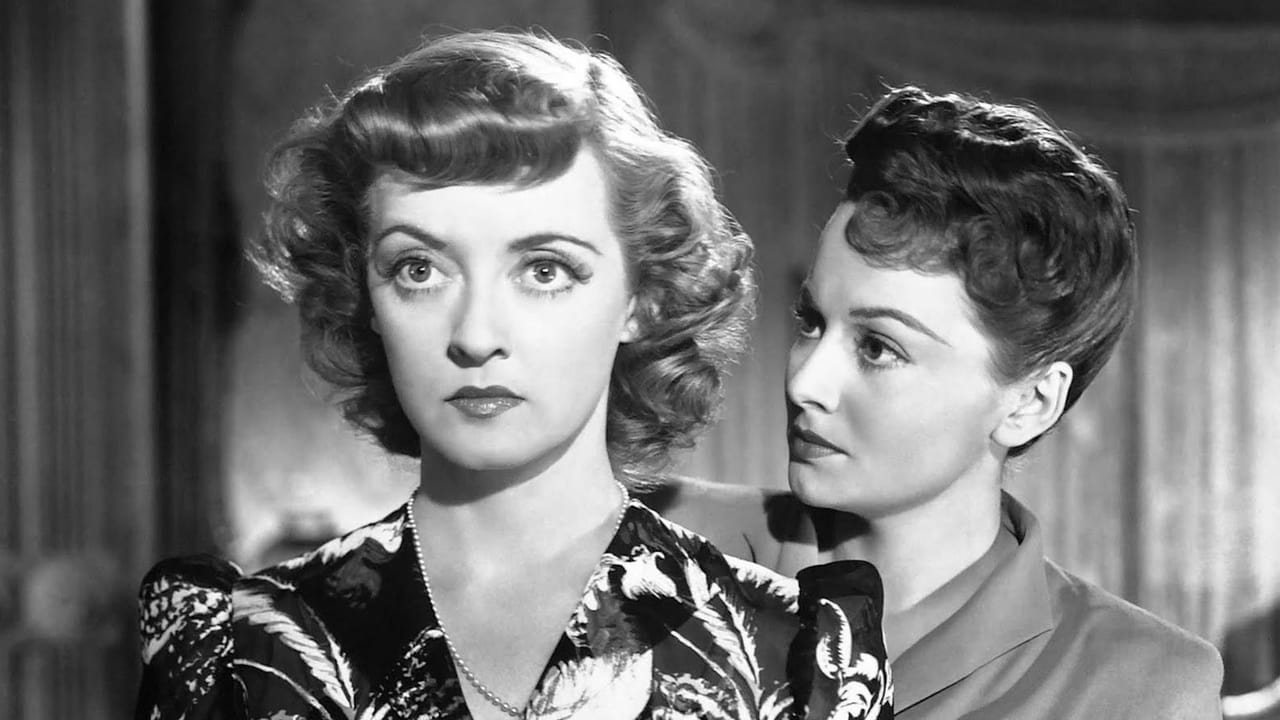Martin Bradley
John Huston's second film, "In This Our Life" may have been just a job of work for him and nothing more than a trashy melodrama but it's undeniably entertaining with a very classy cast even if it does have one of Bette Davis' worst performances, (she's still the bitch but her acting is pinched as if her heart wasn't in it, as if she knows what a crock she's landed herself in). She's the bad sister who steals her good sister's husband and drives him to suicide. Olivia De Havilland is the good sister who finds her backbone after she's been dumped. It was quite daring for its day, even touching on the subject of incest, (Bette has a randy old uncle who has the hots for her and is played with lip-smacking relish by Charles Coburn). The men in their lives are George Brent, (who else?), and Dennis Morgan and there's a nice supporting turn from the young African-American actor Ernest Anderson, (whatever happened to him?) as the boy Bette tries to incriminate in a hit-and-run. Unfortunately poor Hattie McDaniel, only a couple of years after winning an Oscar, is back to playing Mammy and Billie Burke is wasted as the mother who never seems to get out of bed. Huston's heart may not have been in it any more than Bette's but he keeps it moving along at quite a gallop nevertheless.
earlytalkie
Bette Davis chews up the scenery along with most of her co-stars in this fabulously fun melodrama. As Stanley Timberlake, she plays a character with absolutely no redeeming value in this engrossing Warners film from 1942. Olivia de Havilland, playing good sister Roy Timberlake, gives a believable performance, though, if Bette were my sister, I would have done something about her years ago. The film is justly celebrated for it's depiction of racial prejudice as well as it's positive portrayal of African-Americans, something very rare in 1942. The DVD hosts a cornicopia of special features including the theatrical trailer, two Technicolor shorts, one patriotic, the other a beautiful Ballet Russe number, an incomprehensible news reel minus most of it's sound, and a pretty funny Porky Pig cartoon. The film transfer is excellent, with great picture and sound quality, and the quality highlight of the special features is the aforementioned ballet short, in the most gorgeous Technicolor, perfectly restored and presented here.
st-shot
With a phalanx of enablers a wide eyed Bette Davis leaves a path of deception, death and destruction as she roars through this Warners melodrama directed by John Huston. Davis is a spoiled whirlwind (celebrated these days in shows like My Sweet 16 and Bridezilla) as she steals husbands, betrays family and exploits the incestuous hunger of a rich uncle with worse to come.On the eve of her marriage to activist lawyer Craig Fleming (George Brent) Stanley Timberlake (Davis) runs off with her sister Roy's (Olivia DeHavilland) husband. Tiring of this she destroys him and heads back home to a sympathetic family. Once forgiven and re-established it's back to old tricks for Stanley.Bow lipped Bette doesn't blink once as she let's nothing stand in her way to get what she wants. Rages, hissy fits (including a brief Kate Hepburn imitation) define Stanley from the outset and Davis as a twentieth century version of her Jezebel character hammers it home with brio. Over the top and outrageous from beginning to end it's vintage Bette and she dominates the screen. Brent, DeHavilland, Billie Burke, Frank Craven and Dennis Morgan support and suffer the whimsical monster nobly while Charles Coburn, in the most powerful and disturbing role of his career as the lascivious uncle matches her venality.Director Huston and writer Howard Koch infuse In This Our Life with more than the standard Warner weeper melodramatic twists adding dark undertones of perverse desire and destructive self denial that strikes at the underpinnings of the American family. In spite of a loving family Stanley is little more than a feral animal, coldly self absorbed. All the men are weak with the exception of Coburn, a bellowing degenerate exploiter. The Timberlake wives remain in the throes of nervous breakdowns while the daughters male names beg for analogy. Life in it's own way and time is as provocative and disturbing as Huston's Reflections in a Golden Eye made a quarter of a century later in a more relaxed state of censorship. For his part Huston who usually deals with strong, independent males simply reverses the roles here while maintaining his sterling ability to reveal character through setting and angle. Southern based he renders without stridency or stereotype the second class citizenry of the Black American during the period, subtly and effectively injecting it into a crucial part of the plot. Not an easy feat to accomplish in the face of entitled hurricane Bette.
tieman64
"Your creeds are dead, your rites are dead, your social order too! Where tarries he, the Power who said: See, I make all things new?" – Matthew Arnold Ellen Glasgow's novel, "In This Our Life", opens with the above quotation from Matthew Arnold's 1867 poem, "Obermann Once More". Read that quote again, because it sums up John Huston's filmography perfectly and perhaps highlights best what attracted the director to Glasgow's novel.Surprisingly, however, Huston's film completely revokes the tone of Glasgow's novel in favour for super melodrama. This is Douglas Sirk or Max Ophuls territory, Huston laying on the melodrama fast and thick.Beneath the schmaltz (and the interferences of the Hollywood Production Code, which pandered to the anticipated preferences of white audiences to such an extent that Glasgow's intelligent novel is supremely butchered) one can nevertheless tease out the usual Huston themes. Here we have the birth of the "new southern social order", Huston helming one of the very first films in which a black character is presented in a relatively complex light (or rather, in a role other than comic buffoon, fat mama, salivating animal or domesticated servant).The black character in this case is Parry Clay, an African American youth who is blamed for a hit-and-run accident on a child. The real murderer, however, is a character called Stanley Timberlake, a wealthy white woman who employs Parry as a law clerk. Of course, eventually the truth comes out, Parry is released and Stanley attempts to flee. She runs for it, is pursued by the police, and dies in an auto wreck. Poetic justice.Hilariously, the production code required Stanley's death not because of her false statements, lies, or hit-and-run accident, but because she wrecks her sister's marriage. In the novel, Stanley remains alive, proof of how hard it will be for the New South to overcome the white prerogatives of the Old South. Huston fought hard for this ending, but of course didn't have enough clout (this was his second film as director) to win such a battle.The film's other big flaw is this: Glasgow's novel wasn't a melodrama, but a stream-of-consciousness war between a black family and a white family (the Clays and the Timberlakes). For a novel to give equal consideration to a white and black family was unheard of at the time (people preferred Margaret Mitchell's racist, yet Pulitzer winning, "Gone with the Wind"). Huston's film, however, doesn't heed Glasgow's narrative structure and instead relegates the Clays to the peripheries of the action. "In This Our Life" therefore became just another in a long line of flicks which diminish the African-American experience by making it a footnote in the white experience. Huston tries to make up for this by having Bette Davis, who stars as Stanley Timberlake, play Stanley as though she is "telling the truth". The idea here is to manipulate white audiences to "look on" as the race-rationalising white community would. This helps the film somewhat, but it's not enough.7/10 – Bette Davis is great at performing these larger than life devil women. She's always entertaining. The rest of the film, though well meaning, is bogged down by hokey on screen melodrama and off screen concessions. It would take directors like Fuller and Lumet to further chisel away at Hollywood's "racism" (too strong a word, I know), before exploitation cinema, a product of various civil rights movements, kicked the last bastions of the old order down. Of course a new order was quickly built right back up. But that's another story.Worth one viewing.



 AD
AD




